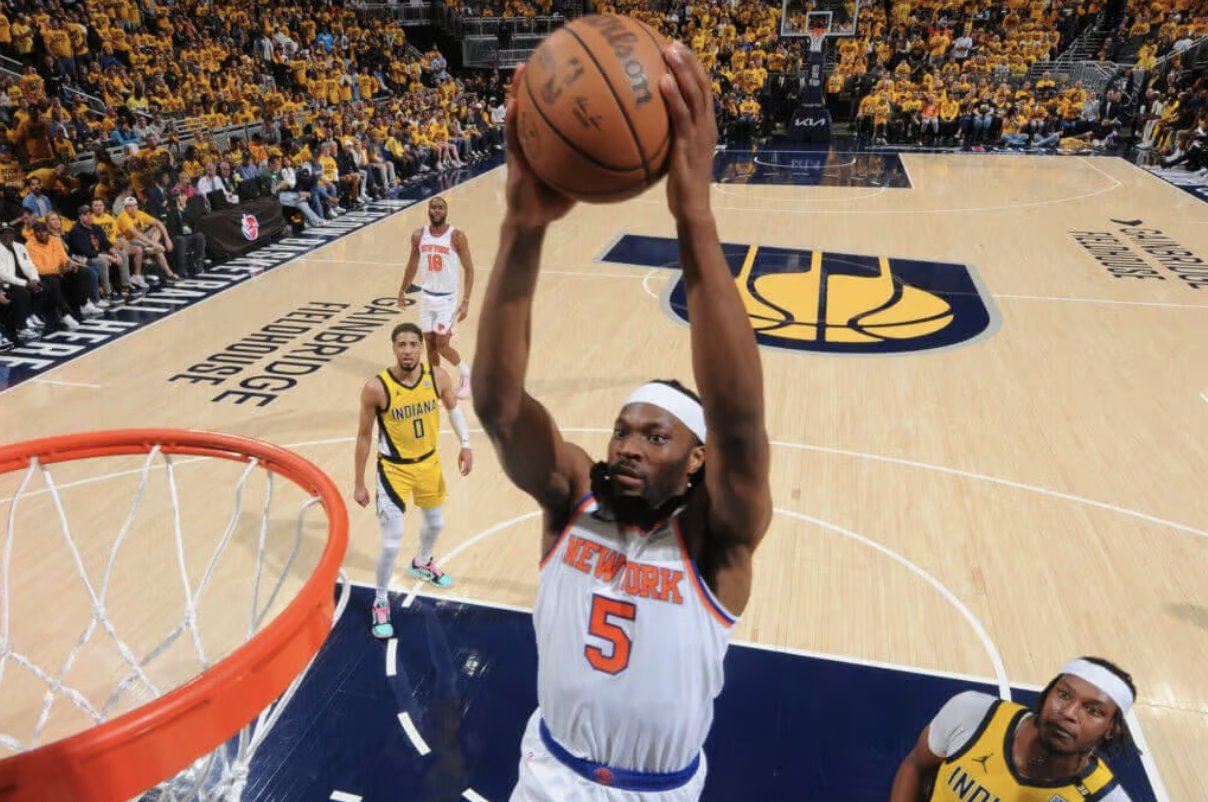You’re right—depth at the center position is crucial, especially with Mitchell Robinson’s injury history. Jericho Sims has shown promise, but he’s still developing, and Ariel Hukporti is an intriguing prospect, though it’s uncertain how quickly he’ll contribute at the NBA level.
The Knicks might need to look at veteran options or trades to bolster their frontcourt depth. There are always free agents or potential trade targets who could provide immediate impact as a backup big. A reliable veteran could not only provide valuable minutes but also mentor the younger guys, which could be beneficial in the long run.
Keeping an eye on the trade market and exploring buyout candidates as the season progresses might be the way to go if they want to ensure they have solid coverage in the frontcourt
Precious Achiuwa would indeed be a solid addition to the Knicks’ roster. His versatility and energy would provide a nice boost to the frontcourt. Achiuwa’s ability to contribute both as a rebounder and a rim protector aligns well with the Knicks’ needs, especially given their concerns about depth and Robinson’s injury history.
Re-signing him could address several issues at once. It would give them a reliable backup big who can play significant minutes and contribute defensively. His familiarity with the Knicks’ system from previous stints would also make for a smoother integration compared to bringing in an entirely new player.
If the Knicks and Achiuwa can find common ground on a contract, it could be a win-win situation. The Knicks would get a much-needed big man with experience, and Achiuwa would have the opportunity to showcase his skills in a familiar environment. It might be worth keeping an eye on any updates or negotiations as the season approaches to see if this reunion comes to fruition.
It’s possible that the delay in reaching a deal between Precious Achiuwa and the Knicks could be part of a strategic maneuver by both parties. Here are a few potential reasons for such a delay:
1. **Market Evaluation:** Both sides might be waiting to see how the market evolves. Achiuwa could be exploring other offers or waiting for teams with more cap space to make a move. Meanwhile, the Knicks might be assessing their roster and evaluating other potential moves before finalizing a deal.
2. **Contract Negotiations:** Negotiating the terms of a contract can be complex, especially when balancing salary cap considerations and long-term team strategy. Both sides might be working through details to ensure they reach a mutually beneficial agreement.
3. **Player Fit and Health:** The Knicks might be waiting to assess Achiuwa’s health or how he fits into their plans for the upcoming season. They could also be evaluating other potential additions or trades before committing to a contract.
4. **Cap Space Management:** The Knicks might be managing their cap space carefully, possibly waiting to see if they can free up more space or if other roster moves might impact their ability to sign Achiuwa.
5. **Strategic Timing:** Both parties could be using the delay to their advantage. Achiuwa might be waiting for the Knicks to offer a more favorable deal, while the Knicks might be leveraging the delay to negotiate better terms or to ensure they have all their options on the table.
If this delay was indeed a strategic decision, it might be in both parties’ best interests to reach an agreement before the start of the season, ensuring that Achiuwa can integrate smoothly into the team and contribute effectively.
That’s a keen observation. The new collective bargaining agreement (CBA) has indeed introduced some complex dynamics that teams need to navigate, particularly when it comes to trade flexibility and salary cap management. Here’s how this situation might play out:
1. **Trade Flexibility:** By re-signing Achiuwa to a contract that’s above the minimum but not exorbitant, the Knicks could effectively create a trade asset. A contract in the $7 million range would give the Knicks more flexibility in trades, allowing them to match salaries more easily and potentially acquire higher-salaried players if needed.
2. **Human Trade Exception:** This strategy of giving a player a higher-than-market-value contract to create a trade asset is becoming known as the “human trade exception.” It essentially allows teams to have more flexibility in trading by having players on contracts that are easier to use in trade scenarios due to their slightly higher value.
3. **Cap Management:** For teams above the first apron (like the Knicks), managing the cap and understanding trade rules becomes more crucial. By structuring Achiuwa’s deal this way, the Knicks could be planning ahead for potential moves, ensuring they have more options available as the trade deadline approaches.
4. **Market and Negotiations:** Achiuwa’s contract might also be influenced by market conditions and negotiations. While this strategy can be advantageous for the Knicks, it’s also a balance between getting a player at a fair value and positioning him as a valuable trade asset.
Overall, this approach highlights the growing sophistication in roster and cap management strategies. Teams are increasingly using these nuances to their advantage, whether to build their roster or to set themselves up for future trades. It’s a smart move by the Knicks if they’re looking to maximize their trade flexibility while also securing a player who can contribute on the court.
